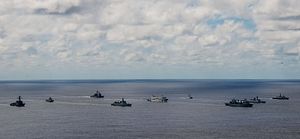Brunei’s defense spending has been slashed by over 25 percent for 2015 as the tiny, oil rich Southeast Asian state’s revenue is projected to decline partly due to falling global oil prices, according to local media reports.
According to The Brunei Times, Second Finance Minister at the Prime Minister’s office, Abdul Rahman Ibrahim, told the 11th Legislative Council on March 10 that the country’s budget would be around BND 537.49 million ($387.66 million) this year, down from the previous year’s BND 719.15 million.
In terms of the breakdown, around BND 336.15 million of the 2015 budget will be dedicated to personnel expenses, BND 169.34 million will go towards recurring annual costs of the military, and the remaining BND32 million is likely to be classified as “special expenditure”.
Within that breakdown, personnel expenses increased by around BND 15.28 million relative to last year. The rise was attributed to increments, the filling of existing vacancies, and the addition of new positions to maintain the extra equipment that the Royal Brunei Navy and Royal Brunei Air Force had acquired. Recurring annual costs, meanwhile, decreased just slightly.
But the largest shift – and a key reason for the large budget decrease – was due to an 86 percent slashing of the special expenditure portion of the budget. The minister attributed this largely to a transfer of funding for the Defense Capability Enhancement Project from the Ministry of Defense (MinDef) to the Ministry of Finance (MoF). But he also admitted that the cut occurred after a more general “review of priorities” on military capabilities and work buildings “in line with the current economic situation.”
This should come as no surprise. Brunei’s economy is highly dependent on the energy sector – with oil and gas accounting for around 70 percent of the country’s nominal GDP and almost all of its exports. With energy prices declining, the country’s economy has suffered, with anemic growth last year and increasing pressure on government finances. This is now including the country’s defense budget, which has remained quite steady over the past few years at about 2.5 percent of GDP.
Nonetheless, the minister assured the council that Brunei’s capabilities – particularly that of the RBAF – would remain at the highest levels amid growing challenges and as the country moves toward realizing its Wawasan (National Vision) 2035. He also said MinDef is currently conducting an in-depth study to ensure that its defense management and long-term planning is cost-effective.
“MinDef will continue to practice prudent spending and ensure corporate governance such as instituting the program and performance budgeting method in management,” he said.































